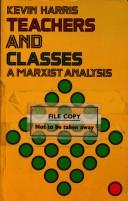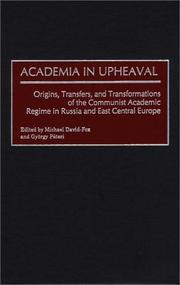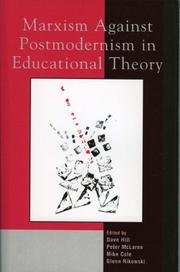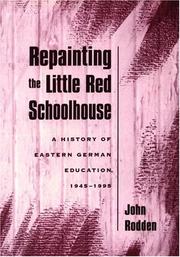| Listing 1 - 10 of 16 | << page >> |
Sort by
|
Book
Year: 1971 Publisher: Halle
Abstract | Keywords | Export | Availability | Bookmark
 Loading...
Loading...Choose an application
- Reference Manager
- EndNote
- RefWorks (Direct export to RefWorks)
Book
ISBN: 1787359840 1787359832 Year: 2023 Publisher: UCL Press
Abstract | Keywords | Export | Availability | Bookmark
 Loading...
Loading...Choose an application
- Reference Manager
- EndNote
- RefWorks (Direct export to RefWorks)
This is the first full-length study of the life and career of Brian Simon (1915-2002), leading Marxist intellectual and historian of education in twentieth-century Britain. Using documentary sources that have only recently become publicly available, it reveals the remarkably broad range of Simon's life as student, soldier and school teacher, Communist Party activist, and educational academic, campaigner and reformer. In a sympathetic biography that yet retains critical distance, the authors analyse Simon's contribution to Marxism and the Communist Party. They explore the influence of both on his work as a historian of education and trace the significance of his Marxist beliefs, political associations and historical approach to the cause of educational reform. In so doing, they consider the full nature and limitations of Simon's achievements in his struggle for education. Unlike many Marxist scholars he remained loyal to the Communist Party in the 1950s, which damaged his reputation as a public intellectual. Nevertheless, his support for comprehensive education helped to promote egalitarian educational reforms in Britain, although he was later unable to provide sufficient resistance to the 1988 Education Reform Act and to a decline in the position of the comprehensive schools. In all this, the significance of Simon's family, and especially his relationship with his wife Joan is to the fore. Joan and Brian forged a formidable 60-year partnership, in politics and the Communist Party as well as in life, that lasted until Brian's death in January 2002. Praise for Brian Simon and the Struggle for Education 'a very interesting book for historians of education and the best overall work about the thought and work of Brian Simon.' Historia y Memoria de la Educación

ISBN: 0710008651 Year: 1982 Publisher: London
Abstract | Keywords | Export | Availability | Bookmark
 Loading...
Loading...Choose an application
- Reference Manager
- EndNote
- RefWorks (Direct export to RefWorks)

ISBN: 0897897080 Year: 2000 Publisher: Westport (Conn.) : Bergin and Garvey,
Abstract | Keywords | Export | Availability | Bookmark
 Loading...
Loading...Choose an application
- Reference Manager
- EndNote
- RefWorks (Direct export to RefWorks)

ISBN: 0739103466 Year: 2002 Publisher: Lanham (Md.) : Lexington books,
Abstract | Keywords | Export | Availability | Bookmark
 Loading...
Loading...Choose an application
- Reference Manager
- EndNote
- RefWorks (Direct export to RefWorks)
Book
ISBN: 0043701140 Year: 1982 Publisher: London Allen and Unwin
Abstract | Keywords | Export | Availability | Bookmark
 Loading...
Loading...Choose an application
- Reference Manager
- EndNote
- RefWorks (Direct export to RefWorks)
Education --- Communism and education --- History --- Communism and education. --- Children --- Education, Primitive --- Education of children --- Human resource development --- Instruction --- Pedagogy --- Schooling --- Students --- Youth --- Civilization --- Learning and scholarship --- Mental discipline --- Schools --- Teaching --- Training --- Education and communism
Book
ISBN: 3883456519 Year: 1983 Publisher: Sankt Augustin Richarz
Abstract | Keywords | Export | Availability | Bookmark
 Loading...
Loading...Choose an application
- Reference Manager
- EndNote
- RefWorks (Direct export to RefWorks)
Communism --- Communism and education --- Education and communism --- Education --- Bolshevism --- Communist movements --- Leninism --- Maoism --- Marxism --- Trotskyism --- Collectivism --- Totalitarianism --- Post-communism --- Socialism --- Village communities --- Communism and education. --- Communism. --- Pedagogiek en onderwijskunde --- didactische theorieën --- didactische theorieën.

ISBN: 019511244X Year: 2002 Publisher: Oxford Oxford university press
Abstract | Keywords | Export | Availability | Bookmark
 Loading...
Loading...Choose an application
- Reference Manager
- EndNote
- RefWorks (Direct export to RefWorks)
This is the first English-language study of GDR education and the first book, in any language, to trace the history of Eastern German education from 1945 through the 1990s. Rodden fully relates the GDR's attempt to create a new Marxist nation by means of educational reform, and looks not only at the changing institution of education but at something the Germans call Bildung--the formation of character and the cultivation of body and spirit. The sociology of nation-building is also addressed.
Communism and education
---
Education
---
Educational change
---
Historische en vergelijkende pedagogiek.
---
History.
---
#BIBC:ruil
Book
ISBN: 023115268X 0231152698 0231526482 1283072785 9786613072788 Year: 2011 Publisher: New York : Columbia University Press,
Abstract | Keywords | Export | Availability | Bookmark
 Loading...
Loading...Choose an application
- Reference Manager
- EndNote
- RefWorks (Direct export to RefWorks)
The New York City Teachers Union shares a deep history with the American left, having participated in some of its most explosive battles. Established in 1916, the union maintained an early, unofficial partnership with the American Communist Party, winning key union positions and advocating a number of Party goals. Clarence Taylor recounts this pivotal relationship and the backlash it created, as the union threw its support behind controversial policies and rights movements. Taylor's research reaffirms the party's close ties with the union yet it also makes clear that the organization was anything but a puppet of Communist power. Reds at the Blackboard showcases the rise of a unique type of unionism that would later dominate the organizational efforts behind civil rights, academic freedom, and the empowerment of blacks and Latinos. Through its affiliation with the Communist Party, the union pioneered what would later become social movement unionism, solidifying ties with labor groups, black and Latino parents, and civil rights organizations to acquire greater school and community resources. It also militantly fought to improve working conditions for teachers while championing broader social concerns. For the first time, Taylor reveals the union's early growth and the somewhat illegal attempts by the Board of Education to eradicate the group. He describes how the infamous Red Squad and other undercover agents worked with the board to bring down the union and how the union and its opponents wrestled with charges of anti-Semitism.
Teachers' unions --- Teachers --- Teachers --- Communism and education --- Civil rights --- History --- History --- Political activity --- History --- History --- History --- Teachers' Union of the City of New York --- History
Book
ISBN: 9781501705397 1501705393 1501707175 9781501707179 Year: 1997 Publisher: Cornell University Press
Abstract | Keywords | Export | Availability | Bookmark
 Loading...
Loading...Choose an application
- Reference Manager
- EndNote
- RefWorks (Direct export to RefWorks)
Using archival materials never previously accessible to Western scholars, Michael David-Fox analyzes Bolshevik Party educational and research initiatives in higher learning after 1917. His fresh consideration of the era of the New Economic Policy and cultural politics after the Revolution explains how new communist institutions rose to parallel and rival conventional higher learning from the Academy of Sciences to the universities. Beginning with the creation of the first party school by intellectuals on the island of Capri in 1909, David-Fox argues, the Bolshevik cultural project was tightly linked to party educational institutions. He provides the first account of the early history and politics of three major institutions founded after the Revolution: Sverdlov Communist University, where the quest to transform everyday life gripped the student movement; the Institute of Red Professors, where the Bolsheviks sought to train a new communist intellectual or red specialist; and the Communist Academy, headquarters for a planned, collectivist, proletarian science.
Communism and education. --- Education, Higher --- Communism and education --- Communism and culture --- History. --- Culture and communism --- Culture --- Education and communism --- Education --- College students --- Higher education --- Postsecondary education --- Universities and colleges --- education --- Institute of Red Professors --- Sverdlov Communist University --- New Economic Policy --- Academy of Sciences --- Bolshevism --- Bolshevik party --- Communist party --- Soviet Union
| Listing 1 - 10 of 16 | << page >> |
Sort by
|

 Search
Search Feedback
Feedback About UniCat
About UniCat  Help
Help News
News